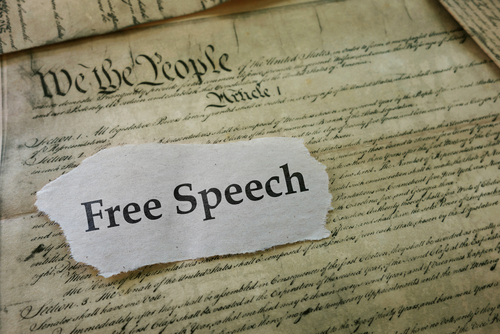“I can do what I want!”
“You’re not the boss of my mind!”
“I have a First Amendment right to say whatever I want!”
Whether from a precocious preteen or a challenging subordinate, the last of these exclamations can challenge even an experienced parent or supervisor. Fortunately for you (and me), this isn’t a parenting blog, so we’ll focus on the employment aspects of this statement. Do employees, in fact, enjoy a First Amendment right to be free from negative job consequences for what they say away from work and off the clock?
First Amendment and Employees
Well, let’s dust off our pocket U.S. Constitution and have a look: “Congress shall make no law . . . abridging the freedom of speech.” So, the First Amendment is really about what the U.S. Congress can’t do. The Fourteenth Amendment extends the prohibition to state governments.
What does that mean in plain, modern English? It means that a private employer can take employment actions against employees and applicants based on their statements (including social media posts), even those made outside of work, without running afoul of the U.S. Constitution.
But what about government employees? Well, they actually do have a First Amendment right not to face negative government action (like being fired) for their off-duty expressions, but this isn’t as broad as the citizen’s right not to face negative government action (like being jailed) for expressing their opinion.
Public School Teacher Makes an Example of Herself
In the case of Hedgepeth v. Britton, decided August 26, 2025, the U.S. 7th Circuit Court of Appeals (whose rulings apply to all employers in Illinois, Indiana, and Wisconsin) considered whether the First Amendment protected a public high school teacher, named Hedgepeth, from Illinois from being fired for inflammatory social media posts she made while on vacation. She was vacationing in Florida while protests related to George Floyd’s death erupted nationwide, including back in her home in Illinois. Hedgepeth, who’d previously been disciplined for profanity-laden outbursts in the classroom, took to Facebook, posting things like the following:
- “Now that the civil war has begun[,] I want to move . . . I need a gun and training.”
- A meme that read, “Wanna stop the Riots? Mobilize the septic tank trucks, put a pressure cannon on em . . . hose em down . . . the end.”
- “I find the term ‘white privilege’ as racist as the ‘N’ word.”
The school district received inquiries and complaints about Hedgepeth’s posts from students, alumni, teachers and staff, parents, and the media. After two public meetings to hear concerns about Hedgepeth’s online activity, the district board decided to fire her.
As a public employee, Hedgepeth’s posts were constitutionally protected by the First Amendment if (1) she was speaking as a citizen on a matter of public concern, and (2) if her interest in speaking freely was not outweighed by the government’s interest in workplace efficiency. While her Facebook musings clearly satisfied the first part of the test, the court held that they failed the second part of the test.
Although clearly addressing a matter of public concern, her posts were informal, vulgar, and not based on any particular expertise she had relevant to the topic, meaning her free-speech interests were weak. Meanwhile, the school district experienced actual disruption as a result of her posts and had good reason to conclude she’d lost the credibility necessary to serve as a role model for students.
Takeaways
The Hedgepeth decision is pretty standard fare for a First Amendment employment decision. So, why write about it? First, I’m on a deadline. Second, to provide evidence for private employers (which, again, aren’t even in the scope of the First Amendment) reluctant to take action based on off-duty activity that they can take action to curtail workplace drama, negative media coverage, or public relations drama.
Now, there are certain types of employee speech that are legally protected, even for private employers, even if they occur off the clock—things like filing a complaint with the Occupational Safety and Health Administration (OSHA) or raising a concern to a manager about what the employee reasonably believes may be unlawful harassment. Also, Section 7 of the National Labor Relations Act (NLRA) protects rank-and-file employees who engage in protected concerted activity for their mutual aid and protection, and the exact parameters of that employee protection is fluid because it’s dictated by the politically appointed National Labor Relations Board (NLRB) members and the NLRB General Counsel.
Some state or local laws may provide employment protections applicable to private employees for certain types of off-duty speech and assembly. Finally, a collective bargaining agreement or employee handbook terms might provide employee protections beyond those in applicable law. Those are the big things private employers need to keep in mind before making an employment decision where the employee’s off-duty speech, protest, or activity is a factor.
Whitney Brown is an attorney with Lehr Middlebrooks Vreeland & Thompson, P.C. in Birmingham, Alabama, and can be reached at 205-323-9274 or wbrown@lehrmiddlebrooks.com.

